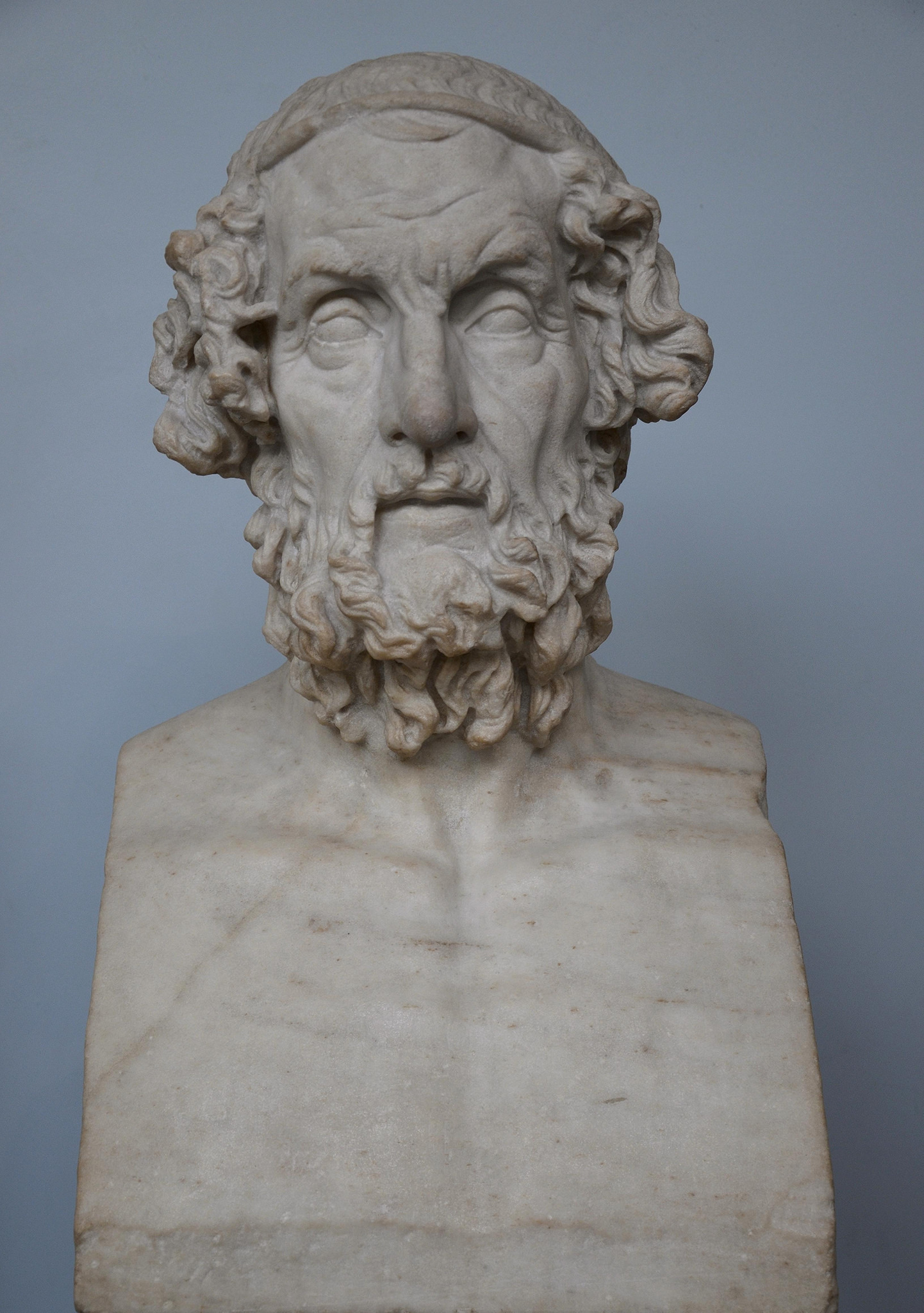Homer, the war, and the oral tradition
Louis Markos, Professor of English and Scholar in Residence at Houston Baptist University, and a frequent public speaker in Houston will present a free lecture on Homer, the Trojan War, and the Oral Tradition.
 1. Oldest Greek civilization appears on the Cycladic Islands (2500 BC), where we find terra cotta images that look like “modern art.” First major civilization and dominant naval power (Thalassocracy) is that of Minoan Crete (2000-1500), headquartered at the Palace of Knossos, which boasts “modern” plumbing/architecture. If there was an Atlantis, it was likely Minoan Crete, which was weakened by the volcanic explosion of Thera in 1500.
1. Oldest Greek civilization appears on the Cycladic Islands (2500 BC), where we find terra cotta images that look like “modern art.” First major civilization and dominant naval power (Thalassocracy) is that of Minoan Crete (2000-1500), headquartered at the Palace of Knossos, which boasts “modern” plumbing/architecture. If there was an Atlantis, it was likely Minoan Crete, which was weakened by the volcanic explosion of Thera in 1500.
2. Crete is sacked in 1420 and power shifts to the Greek Mainland, with the center in Peloponnese. This period is known as the Mycenaean Bronze Age for the strongest power is at Mycenae (Agamemnon). Other centers at Tiryns (Diomedes), Pylos (Nestor), Sparta (Menelaus). A bureaucratic empire based on trade throughout Aegean; their written language (Linear B) consists mostly of “shopping lists.” Trojan War occurs at the height of Mycenae (1250-1200); probably fought in part to control trade to the Black Sea, the breadbasket of Greece.
3. 12th century brings Fall of Mycenae, which sets off a domino effect, destroying all centers one by one. Greece falls into a Dark Age (the art of writing is lost; construction in wood). An “Aryan” race enters Greece from the north (Dorian Invasion), ushering in the Iron Age.
4. During the Dark Ages, stories of the Trojan War are told to link Greece with her heroic past. To facilitate this Oral Tradition, tales are put into verse, using the epic meter of Dactylic Hexameter. Other Epic Conventions also arise to aid memory: repetition, set phrases, etc.
5. Later in Dark Ages, Ionian Migration, as displaced Greeks cross the Aegean to settle on the Asia Minor Coast (Ionia). Immigrants carry tales of Troy with them as a link to the mainland. Ionia becomes the new power and cultural center of Greek civilization.
6. During the 8th century, a School of Bards arises in Ionia that systematizes and codifies the rules of Oral tradition. Homer (an Ionian bard, most likely from Chios) collects tales into a single long poem (late 8th century); at this time, language "reinvented" by Phoenician sailors.
7. 6th century. As Ionia falls under the sway of Lydians, Babylonians, Persians, Greek culture is reborn in mainland Greece: not Peloponnese but Athens. The enlightened tyrant Peisistratus (ancient Huey Long) seizes control, carries out public works programs, and funds the arts; he establishes Panathenaic Festival, at which Rhapsodes recite entire Iliad and Odyssey over several days. At this point, epics are probably put into written form, in an authorized edition.
8. 6th-3rd century: Iliad & Odyssey function as textbooks of Greek Culture, providing the foundation for Golden Age of Greece (5th century), which passes, via Aristotle, to Alexander the Great, who founds Alexandria, Egypt—it becomes the new center of Greek (Hellenistic) culture.
9. Head Librarians at Alexandria like Zenodotus (3rd century) and Aristarchus (2nd century) edit epics, add Book and Line numbers. Certainly, by 150, epics exist in written form.
Louis Markos, Professor in English & Scholar in Residence at Houston Baptist Univ., holds the Robert H. Ray Chair in Humanities; his 18 books include From Achilles to Christ, Heaven and Hell, worldview guides to the Iliad and Odyssey, and The Dreaming Stone & In the Shadow of Troy (novels in which his children become part of Greek mythology & the Iliad and Odyssey).

| Louis Markos (www.Loumarkos.com) holds a BA in English and History from ColgateUniversity and an MA and PhD in English from the University of Michigan. He is a Professor of English and Scholar in Residence at Houston Baptist University, where he teaches courses on BritishRomantic and Victorian Poetry and Prose, the Classics, C. S. Lewis and J. R. R. Tolkien, and Film. Dr. Markos also holds the Robert H.Ray Chair in Humanities and lectures on Ancient Greece and Rome, the Middle Ages, the Renaissance, and Romanticism for HBU’s Honors College. He is the author of sixteen published books and two lecture series with the Teaching Company GreatCourses (The Life and Writings of C. S. Lewis; Plato to Postmodernism: Understanding the Essence of Literature and the Role of the Author). He has published over 150 articles and reviews in such journals as Christianity Today, Touchstone, Theology Today, Christian Research Journal, Mythlore, Christian Scholar’s Review, Saint AustinReview, American Arts Quarterly, and The City, and had his modern adaptation of Euripides’Iphigenia in Tauris, Euripides’ Helen, and Sophocles’ Electra performed off-Broadway. Sophocles’ Electra performed off-Broadway. He is a popular speaker in Houston, and has given over 300 public lectures on such topics as C. S.Lewis, apologetics, education, ancient Greece, ancient Rome, and Dante in over two dozen states and in British Columbia, Canada, Oxford, England, and Rome.Dr. Markos is committed to the concept of the Professor as Public Educator and believes that knowledge must not be walled up in the Academy but must be disseminated to all who have ears to hear. |
Event Information
| Event Date | 09-14-2019 3:00 pm CST |
| Event End Date | 09-14-2019 5:00 pm CST |
| Available Place | 196 |
| Individual Price | Free |
| Speaker | Dr. Louis Markos |
| Location | Czech Center Museum |